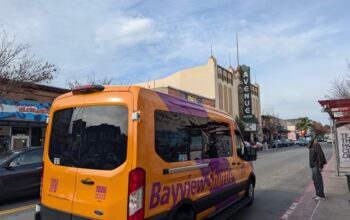L.A. has a massive crime, homeless and illegal alien crisis. Bus riders are down and government transportation system deficits are up. But, the bureaucrats have decided to make it extremely dangerous to drive on main streets—they are putting bus lanes in the MIDDLE of car lanes. Try making a right turn, left turn or change lanes! This is a disaster for cars—a bonanza for auto repair shops. Now they want to put CCTV camera’s monitoring the lanes. The good news is that this will help prove whether it was the car or the bus that caused the accident.
“The City Council Tuesday advanced a pilot program in partnership with L.A. Metro aimed at curbing vehicles blocking bus-only lanes and zones.
In a unanimous vote, council members approved an ordinance establishing fines for vehicles that park in bus-only lanes. Violators can face a penalty of $293, which can increase to $381 for late payment, followed by an increase to $406 for subsequent failure to pay on time.
Under the pilot program, about 100 cameras will be installed on buses along Line 212 on La Brea Boulevard and Line 720 on Wilshire Boulevard. After two months, cameras also will be installed on Lines 910-950 on the Silver Line and Line 70 on Olive Street/Grand Avenue.”
LA Council Approves CCTV for Bus Lanes
MyNEWSLA, Contributing Editor, 10/8/24 https://mynewsla.com/government/2024/10/08/la-to-use-cameras-to-catch-drivers-blocking-bus-lanes-2/#google_vignette
The City Council Tuesday advanced a pilot program in partnership with L.A. Metro aimed at curbing vehicles blocking bus-only lanes and zones.
In a unanimous vote, council members approved an ordinance establishing fines for vehicles that park in bus-only lanes. Violators can face a penalty of $293, which can increase to $381 for late payment, followed by an increase to $406 for subsequent failure to pay on time.
Under the pilot program, about 100 cameras will be installed on buses along Line 212 on La Brea Boulevard and Line 720 on Wilshire Boulevard. After two months, cameras also will be installed on Lines 910-950 on the Silver Line and Line 70 on Olive Street/Grand Avenue.
Before the city moves forward with the program, Metro and the Los Angeles Department of Transportation are expected to conduct outreach to inform residents. The transit agencies will issue warnings for the first 60 days of the program, with citations sent out early next year.
While the City Council approved the program without much discussion, two council members called for reports on how the city could use the money generated from citations.
Councilwoman Eunisses Hernandez sought revenue to fund positions within LADOT and bolster street improvements such as speed humps and bumps, and other measures to curb speeding along the city’s most dangerous streets. Councilwoman Traci Park called for money to be used for efforts related to the 2028 Olympic Games.
The councilwomen’s amendments were sent to the Budget, Finance and Innovation Committee for further discussion.
Bottom of Form
The pilot program has been years in the making, and results from Assembly Bill 917, signed into law by Gov. Gavin Newsom in 2021. The bill authorized public transit agencies statewide to implement such programs.
Metro is expected to report back to the state Legislature on the effectiveness of its on-bus-camera enforcement program, as well as the impact on privacy, traffic outcomes, costs, citations issued and generation of revenue.
Cameras are expected to capture license plates of vehicles parked in bus lanes and bus zones within the city. The transit agency will then provide the information to LADOT, which will confirm violations and issue citations by mail. Images captured by the cameras that are irrelevant to enforcement will be deleted within 15 days, according to a July report from LADOT’s Laura Rubio-Cornejo.
Revenue is set to be split 75/25 between Metro and LADOT. The department estimates the program will bring in $5.4 million annually.
The transit agency conducted a mini-test run of its camera system on 720 Wilshire Rapid and J Line 910 buses from November to December 2021. Some 823 violations were captured with a 92% accuracy, according to Metro.
Transit officials anticipate issuing 108,000 annual citations based on Metro’s test run.
Rubio-Cornejo noted the program will increase enforcement efficiency, which can aid the department as the fiscal year 2024-25 budget eliminated more than 50 traffic officers.
“The program will also reduce traffic congestion, improve air quality, and lower the frequency of illegally parked vehicles in bus lanes and zones, which is not only a safety concern, but a significant source of delays to buses during peak hours,” according to the report.




Very shred! California is not passing laws to take your car away. It is passing law to make you want to give up driving, A longer approach but the same result!